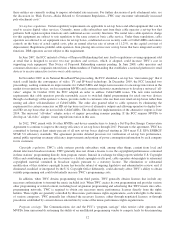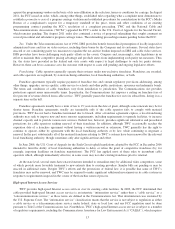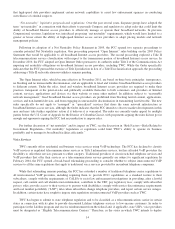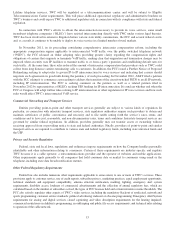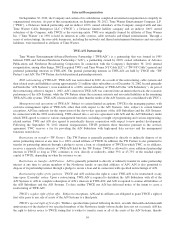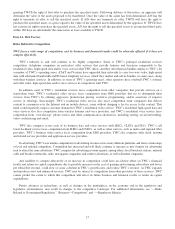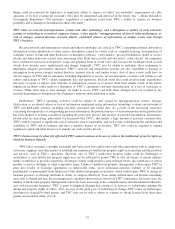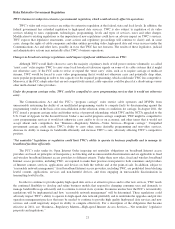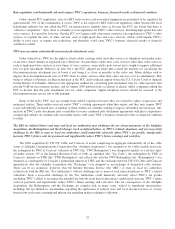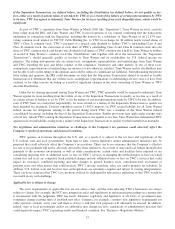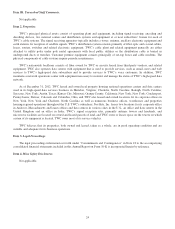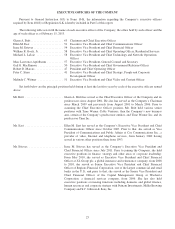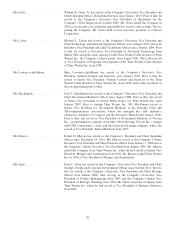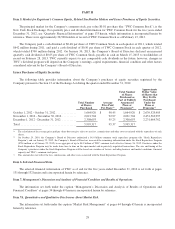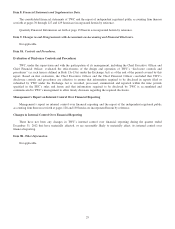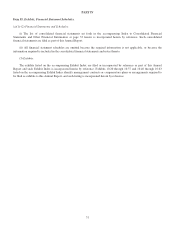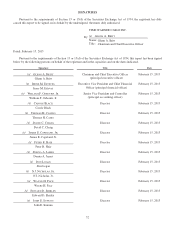Time Warner Cable 2012 Annual Report Download - page 32
Download and view the complete annual report
Please find page 32 of the 2012 Time Warner Cable annual report below. You can navigate through the pages in the report by either clicking on the pages listed below, or by using the keyword search tool below to find specific information within the annual report.Rate regulation could materially adversely impact TWC’s operations, business, financial results or financial condition.
Under current FCC regulations, rates for BST video service and associated equipment are permitted to be regulated. In
approximately 70% of the communities it serves, TWC is not subject to BST video rate regulation, either because the local
franchising authority has not asked the FCC for permission to regulate rates or because the FCC has found that there is
“effective competition.” Also, there is currently no rate regulation for TWC’s other services, including high-speed data and
voice services. It is possible, however, that the FCC or Congress will adopt more extensive rate regulation for TWC’s video
services or regulate the rates of other services, such as high-speed data and voice services, which could impede TWC’s
ability to raise rates, or require rate reductions, and therefore could cause TWC’s business, financial results or financial
condition to suffer.
TWC may encounter substantially increased pole attachment costs.
Under federal law, TWC has the right to attach cables carrying video and other services to telephone and similar poles
of investor-owned utilities at regulated rates. However, because these cables may carry services other than video services,
such as high-speed data services or new forms of voice services, some utility pole owners have sought to impose additional
fees for pole attachment. Effective in June 2011, the FCC adopted an Order that revised the formula for calculating the
telecommunications attachment rate to lower it and bring it as close as possible to the video rate. Many utilities seek to
impose the telecommunications rate on TWC when it carries services other than video services over its attachments. This
Order is subject to Petitions for Reconsideration at the FCC and to judicial appeal before the U.S. Circuit Court of Appeals
for the District of Columbia. Moreover, the appropriate method for calculating pole attachment rates for cable operators that
provide VoIP services remains unclear, and an August 2009 petition from a coalition of electric utility companies asking the
FCC to declare that the pole attachment rate for cable companies’ digital telephone service should be assessed at the
telecommunications service rate is still pending.
Some of the poles TWC uses are exempt from federal regulation because they are owned by utility cooperatives and
municipal entities. These entities may not renew TWC’s existing agreements when they expire, and they may require TWC
to pay substantially increased fees. A number of these entities are currently seeking to impose substantial rate increases. Any
increase in TWC’s pole attachment rates or inability to secure continued pole attachment agreements with these cooperatives
or municipal utilities on commercially reasonable terms could cause TWC’s business, financial results or financial condition
to suffer.
The IRS (as defined below) and state and local tax authorities may challenge the tax characterizations of the Adelphia
Acquisition, the Redemptions and the Exchange (each as defined below), or TWC’s related valuations, and any successful
challenge by the IRS or state or local tax authorities could materially adversely affect TWC’s tax profile, significantly
increase TWC’s future cash tax payments and significantly reduce TWC’s future earnings and cash flow.
The 2006 acquisition by TW NY Cable and Comcast of assets comprising in aggregate substantially all of the cable
assets of Adelphia Communications Corporation (the “Adelphia Acquisition”) was designed to be a fully taxable asset sale,
the redemption by TWC of Comcast’s interests in TWC (the “TWC Redemption”) was designed to qualify as a tax-free split-
off under section 355 of the Internal Revenue Code of 1986, as amended (the “Tax Code”), the redemption by TWE of
Comcast’s interests in TWE (the “TWE Redemption” and collectively with the TWC Redemption, the “Redemptions”) was
designed as a redemption of Comcast’s partnership interest in TWE, and the exchange between TW NY Cable and Comcast
immediately after the Adelphia Acquisition (the “Exchange”) was designed as an exchange of designated cable systems.
There can be no assurance, however, that the Internal Revenue Service (the “IRS”) or state or local tax authorities
(collectively with the IRS, the “Tax Authorities”) will not challenge one or more of such characterizations or TWC’s related
valuations. Such a successful challenge by the Tax Authorities could materially adversely affect TWC’s tax profile
(including TWC’s ability to recognize the intended tax benefits from these transactions), significantly increase TWC’s future
cash tax payments and significantly reduce TWC’s future earnings and cash flow. The tax consequences of the Adelphia
Acquisition, the Redemptions and the Exchange are complex and, in many cases, subject to significant uncertainties,
including, but not limited to, uncertainties regarding the application of federal, state and local income tax laws to various
transactions and events contemplated therein and regarding matters relating to valuation.
22


